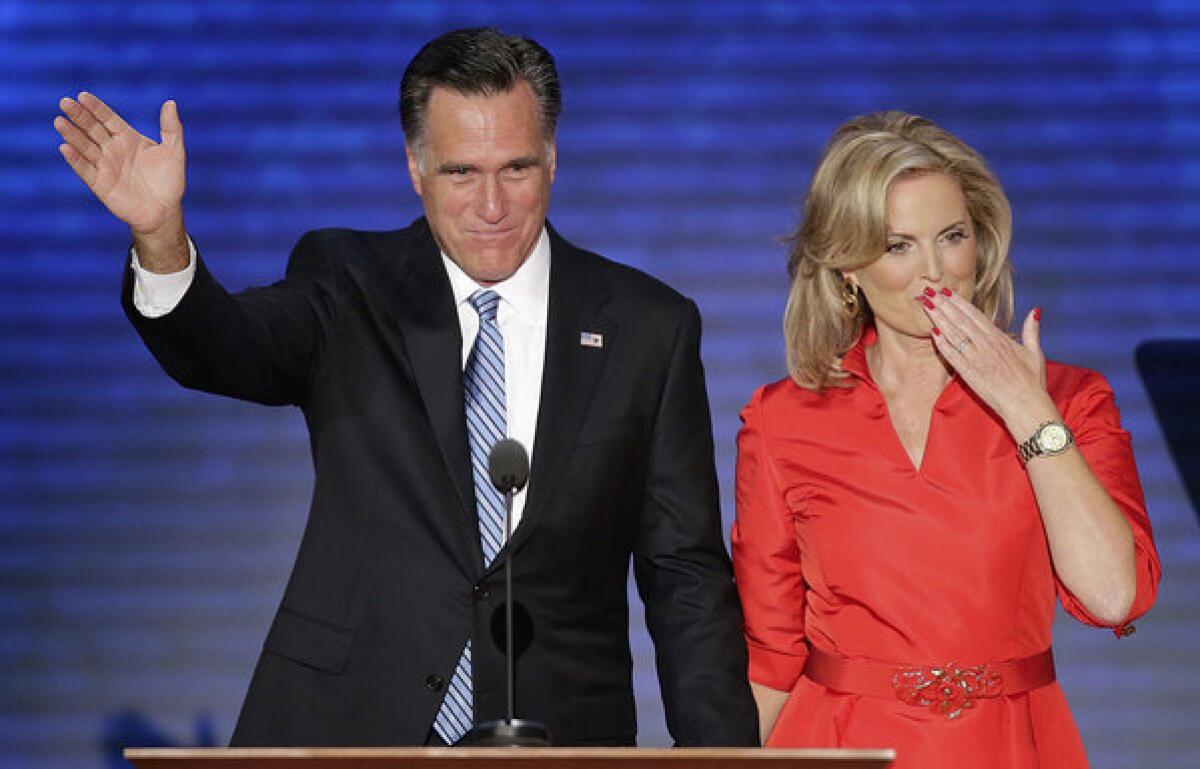For Mitt Romney, the election hinges on the middle class

- Share via
TAMPA, Fla. — The conventional wisdom is that this week’s Republican National Convention needs to make Mitt Romney more “likable” — to replace his image as a frosty billionaire with the warmer (and, friends say, more accurate) picture of a family man, devout Mormon and private do-gooder.
And yes, the convention began on Tuesday with biographical tributes, testimonials to Mitt the mensch and an appealing speech from the candidate’s appealing wife, Ann Romney, who said: “You can trust Mitt.... He will take us to a better place.”
But likability isn’t Romney’s real problem. If likability were a necessary part of electability, Richard M. Nixon wouldn’t have won two presidential elections.
Instead, what Romney needs to do at this convention is convince struggling middle-class voters that he will address their needs more effectively than President Obama has.
Romney’s advisors here were heartened this week by polls showing their candidate running even with Obama, even before the three-day infomercial of the convention. The same polls show him winning on the key question of which candidate voters trust more to fix the economy.
But there’s also a poll number that’s a headache for Romney: the one showing that most voters think that his policies as president would favor the wealthy. For Obama, the numbers are reversed: Most voters said his policies favor the middle class.
VIDEO: Mitt Romney’s Road to Tampa
Since almost 90% of Americans consider themselves members of the middle class, that’s a problem for Romney, one far more serious than the silly issue of likability.
So the real goal of Team Romney in Tampa this week is this: To show voters a new side of their candidate — not warm-and-fuzzy Mitt, but Middle-Class Mitt.
Romney won’t claim to be a son of the middle class (that would strain credulity, even among the faithful), but he will try to show that middle-income families, not just the wealthy, would benefit from the changes he seeks.
COMMENTARY AND ANALYSIS: Presidential Election 2012
Expect to hear less about capital gains tax rates and more about jobs, higher take-home pay, even better training programs for the unemployed.
Expect to hear the words “middle class” a lot too; every Romney surrogate I’ve talked to here at the convention seems to be reading from the same set of talking points.
The retooling of the Romney message began several weeks ago, when the candidate boiled his 59-point “Plan for Jobs and Economic Growth” down to a five-point “Plan for a Stronger Middle Class.” The proposals were the same, but the emphasis was different: more about help for small businesses, less about tax cuts.
Middle-Class Mitt faces several obstacles, however.
For one thing, Obama and his campaign claimed the territory first. The president has been relentless in wrapping the words “middle class” around his programs — and in portraying Romney as the kind of businessman who eliminates jobs more often than he creates them.
Voters “don’t know much about Mitt Romney, and they have been told a bunch of terrible things about him,” said former Mississippi Gov. Haley Barbour, mockingly reeling off a list: “He doesn’t care about people like you. He ships jobs to China.... He’s a plutocrat married to a known equestrian.”
But the problem isn’t Romney’s wealth — or even the fact that Ann Romney is a “known equestrian;” it’s his policies and the language he uses to describe them.
Americans don’t merely admire the rich, especially the working rich; we vote for them all the time. Heck, we’d like to be them.
But Romney is a rich man whose policies often sound — to many voters, anyway — aimed at helping job creators more than job holders. His tax plan’s centerpiece, for example, is a reduction in all income tax rates by 20%, a change that would benefit high-income, high-tax households most. Critics charge that a cut that deep would require eliminating middle-class tax breaks like the mortgage interest deduction; Romney says he would protect the middle class, but he hasn’t spelled out how. Meanwhile, his plan also eliminates several tax breaks for the working poor; in some cases, their tax bills would go up as everyone else’s went down.
Romney has sometimes sounded as if he were still stuck in the GOP primaries, describing his economic plan as a quest for economic freedom (whose benefits conservatives take as self-evident) rather than a step-by-step program to revive the economy. But voters who believe that tax cuts are the best way to spur growth have already made up their minds. Romney needs a few more undecided voters, the ones without strong views on economic theory, if he is to win.
And, of course, Romney has to sound as if he means it. For a candidate who has long faced charges that he flip-flops, another retooling won’t be risk-free.
It’s fashionable to dismiss the conventions as outmoded, bloated talkathons — and they are. But this year, the conventions might also matter. After a summer of squabbling over less important issues, Romney and Obama now have a chance to begin a clear head-to-head debate over the central question of the election: Who has the better plan for reviving the economy?
More to Read
Get the L.A. Times Politics newsletter
Deeply reported insights into legislation, politics and policy from Sacramento, Washington and beyond. In your inbox twice per week.
You may occasionally receive promotional content from the Los Angeles Times.











